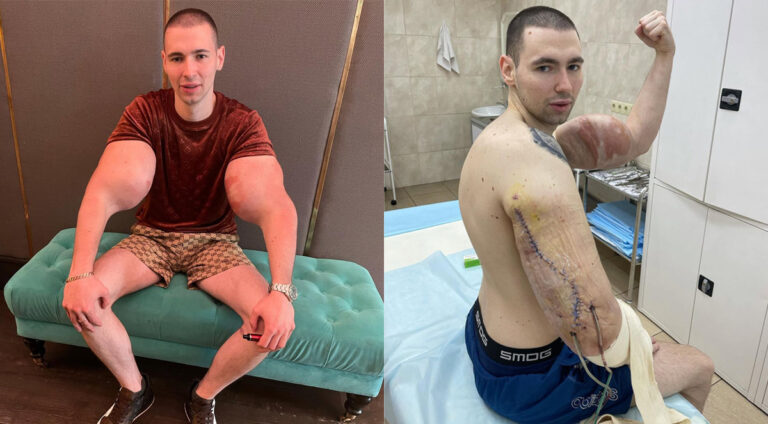Man who INJECTED OIL into his biceps now at risk of losing his rotting arms
25-year-old Kirill Tereshin has been a prominent mixed martial arts (MMA) fighter in Moscow for several years now. At one point of time, however, he started suffering from bigorexia—a body image disorder where individuals, especially bodybuilders, are obsessed with getting as big as possible. In an effort to get jumbo biceps and achieve the “swole” look, Tereshin started injecting oil into his arms.
Now, using site enhancement oil (SEO) for visual appearances has been a common practice for MMA fighters. Dubbed ‘synthol’, the concoction is a petroleum jelly-like substance which is typically composed of 85 per cent oil, 7.5 per cent benzyl alcohol and 7.5 per cent lidocaine—which makes up 100 per cent of the reason why one should never administer this into their body.
What’s even worse, Tereshin took things one step further by brewing the jelly at home and injecting 10 syringes-worth of synthol everyday for an entire month into his arms. Tereshin’s ultimate goal? To make his biceps exactly 27 inches huge.
Garnering the nickname “Russian Popeye,” the MMA fighter currently posts random sketches on TikTok and Instagram, where he has amassed close to 1 million and 300,000 followers respectively. The comment section of both these platforms is quite similar—with users wondering “How is this guy still alive?” and “When will his arms fall off?”
Well, it turns out that Tereshin has been paying the price for his self-administration. Soon after injecting synthol, his arms started flaring up and became oddly discoloured. The fake implants also subjected him to high fever, intense pain and frequent bouts of weakness.
At the time, several doctors warned that he might face paralysis and even have to get his arms amputated if he kept injecting more oil. Tereshin ignored all of the expert recommendations until 2019, when he was forced to undergo surgery to clear his clogged-up triceps, remove the dead muscle and drain his arms of excess fluid triggered by the substance.
In 2021, he was subjected to another operation where doctors removed masses of dead muscle that had been poisoned by his bootleg bulking method. “He will face further operations to extract the substance and the muscle that formed during his quest to achieve beach-ball-like biceps,” The Sun reported on the matter last year.
Currently awaiting his third surgery, Tereshin told the publication that he was “very lucky” to get doctors who were willing to treat him. “I’m only 24, and my immune system is so far coping with this inflammation, but I really do not know what will happen next,” he said back in 2021. “That is why I started the surgeries to get rid of this nightmare.”
Tereshin also acknowledged how he regrets his decision to get DIY implants back when he was 20-years-old. “I did not think about the consequences. I should have thought about this earlier, I know. I blame myself, I know I’m guilty,” he concluded.





